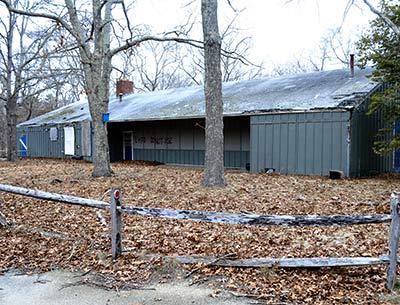Restoration Under Way

Management goals, maintenance plans, and operating and capital budgets for the many historic properties and buildings owned by East Hampton Town — with focus on Fort Pond House in Montauk and the mess hall at Boys Harbor, a former summer camp in Northwest — are being developed, the East Hampton Town Board was told on March 17, when Andrew Harris, the chairman of the town’s property management committee, described what he called a “consistent and common approach” to needed restoration and plans for public use.
Fort Pond House, which is on four waterfront acres that have been named Carol Morrison Park after a late steward of Montauk’s environment, had fallen into disrepair. Repairs already are underway there using town funds, Mr. Harris said. The structure has been stabilized and the roof repaired, and invasive species are being removed with the help of local volunteers.
Eight groups have expressed interest in using the property, Mr. Harris said, and others who may wish to use the site will be contacted. It is hoped, he said, that all the needed work will be completed this spring so that the property can be opened to the public this summer.
The former Boys Harbor camp, on 26 acres off Springy Banks Road, contains restrooms and a drinking water source at the former mess hall, amenities that are not available at a number of other town properties, Mr. Harris said, so it warrants preservation. The committee has recommended converting the mess hall, which is in need of repair, to an open-air pavilion until it can be fully restored. It could be used for get-togethers and passive recreation, he said, in a way similar to the pavilion at Maidstone Park, a popular town-owned site on Gardiner’s Bay. Other structures at Boys Harbor were removed, Councilman Peter Van Scoyoc said, and the mess hall left with an eye toward restoration though its demolition had been considered.
The town board-appointed East Hampton Arts Council floated ideas last year for the use of the building, suggesting it could contain an exhibit/workshop/rehearsal space, classroom, dressing rooms, and a video and film viewing area. The group said if it received a long-term lease it would begin a capital campaign to raise approximately $1.7 million toward restoration and maintenance. But, Mr. Van Scoyoc said, the council “is not at a point where construction and repairs can take place.”
Mr. Harris told the board that the committee did an in-depth analysis of all the properties, looking at natural conditions, buildings, zoning designations, legal issues, and how the properties were acquired and for what purpose.
The Brooks-Park property in Springs and Second House in Montauk are also on the committee’s agenda, and restoration of two other historic properties will continue this year using money from the community preservation fund, according to Scott Wilson, the town’s director of land acquisition and management. The latter are Duck Creek Farm in Springs, where the house was stabilized some years ago and the barn restored, but additional work, including the creation of a handicapped-accessible parking area, is to continue this year. A garage will be outfitted with bathrooms and a storage and mechanical equipment area and some landscaping done at an estimated cost of $500,000.
“The setting is really amazing,” Councilman Van Scoyoc said. “You look around and you think you could be in the early 1700s.” He said that two successful art events took place at the farm last summer.
The barn at the former Selah Lester farm on North Main and Cedar Streets in East Hampton, where a farm museum has been created in the main house, is to be restored to a historically accurate state, with two additions removed, a loft eliminated, and sliding barn doors installed, Mr. Wilson said. The cost is estimated at $250,000.
“Wonderful progress has been made here,” Town Supervisor Larry Cantwell said at the end of the March 17 presentation. The property management committee, he said, “clearly has brought expertise, and a certain professionalism.”
Meanwhile, the future of another building the town owns is under discussion. The Podell House, a four-bedroom residence on Accabonac Road in East Hampton that had been donated to the town some time ago, had been used for the last several years by the Family Service League, a counseling agency. However, the agency has moved to new quarters at the Accabonac Apartment affordable housing complex, where a county health clinic used to be.
Board members met recently with members of the East Hampton Clericus, who have suggested using the house as a shelter for the homeless. Also suggested have been using the property for transitional or temporary housing for residents in need, or offering it to a qualified resident or family through the town’s affordable housing program.
